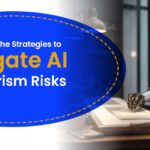The emergence of artificial intelligence (AI) in content generation has ignited a multifaceted discourse encompassing ethical considerations, search engine optimization (SEO) nuances, and the criticality of human oversight. This transformative landscape in content creation has prompted scholars, practitioners, and ethicists alike to scrutinize the implications of AI-driven content creation.
Read Also This – Google’s Revised SEO Starter Guide
At the forefront of this debate is the evolving perception of AI-generated content relative to human-authored material. Surprisingly, empirical research indicates a notable segment of the population deems AI-generated content as comparable to, if not superior to, content crafted by human hands. This perceptual shift underscores a fundamental re-evaluation of traditional notions surrounding authorship and creativity, as well as a growing acceptance of AI as a viable content creator. Yet, amidst this perceptual evolution lies a nexus of ethical quandaries and practical considerations that warrant exploration.
Read Also This – Beyond Click-Through Rate in PPC Marketing
Ethical Concerns in Using Generative AI:
Generative AI, hailed for its efficiency in content creation, triggers a cascade of ethical considerations that reverberate across various domains. Foremost among these concerns is the preservation of originality and authenticity in generated content. As AI algorithms churn out vast quantities of text, images, and videos, discerning the provenance of such content becomes increasingly challenging, raising doubts about its authenticity and veracity. This opacity not only undermines trust between creators and consumers but also exacerbates the proliferation of misinformation and disinformation in the digital marketing ecosystem.
The advent of deepfakes epitomizes the perilous potential of generative AI to manipulate and distort reality, perpetuating false narratives with alarming realism. These synthetic media creations blur the boundaries between fact and fiction, casting doubt on the credibility of visual evidence and jeopardizing public discourse. The societal ramifications of deepfakes extend beyond mere entertainment or novelty, manifesting in tangible threats to democracy, national security, and individual privacy. The unchecked proliferation of deepfakes underscores the urgent need for robust ethical frameworks and regulatory safeguards to mitigate their adverse impacts on society.
Read Also This – Digital Marketing Success With A Monthly Newsletter Guide
Furthermore, the unauthorized utilization of copyrighted material by AI models raises thorny legal and ethical quandaries surrounding intellectual property rights and fair use. The legal dispute between The New York Times and Microsoft over the latter’s use of copyrighted content in its AI-powered news aggregation service underscores the complexities of navigating intellectual property laws in the age of AI. As generative AI blurs the boundaries between original and derivative works, copyright holders face mounting challenges in safeguarding their creative assets and preserving their economic interests.
In navigating these ethical minefields, stakeholders must prioritize transparency, accountability, and responsible innovation to ensure that generative AI serves the collective good without compromising ethical principles or undermining societal values. Collaborative efforts between technologists, policymakers, ethicists, and civil society actors are essential to forge consensus on ethical standards and regulatory frameworks that balance innovation with ethical considerations, thereby fostering a more equitable and sustainable digital future.
Transparency and Attribution:
Transparency and attribution stand as foundational pillars in addressing ethical quandaries inherent in AI-generated content. By transparently attributing content to its original creators, fairness is upheld, and intellectual property rights are duly acknowledged. Yet, the proliferation of AI-generated content introduces complexities, particularly in cases where multiple parties benefit from its production. Balancing the principles of fair use and guarding against exploitation necessitates the establishment of clear guidelines and robust mechanisms for attributing content to its rightful creators. In this evolving landscape, where AI blurs the lines between authorship and automation, transparency and attribution emerge as indispensable safeguards, ensuring equitable recognition and ethical integrity in content creation and dissemination.
Read Also This – Google AdMob’s Technical Ad Delivery Solution
Ethically, the rise of AI-generated content raises fundamental questions about accountability, transparency, and authenticity. As AI algorithms increasingly mimic human writing styles and tones, the delineation between human and machine-authored content becomes increasingly blurred. This blurring of boundaries engenders concerns about intellectual property rights, plagiarism, and the erosion of trust between content creators and consumers. Moreover, the opacity of AI algorithms complicates efforts to ascertain the provenance and veracity of AI-generated content, exacerbating concerns surrounding misinformation and algorithmic bias.
In the realm of search engine optimization (SEO), the proliferation of AI-generated content introduces a host of complexities and uncertainties. While AI-driven tools offer unparalleled scalability and efficiency in content production, they also pose inherent risks of keyword stuffing, duplicate content, and low-quality output. Search engines continually refine their algorithms to detect and penalize such malpractices, necessitating vigilant oversight and strategic optimization strategies to safeguard against potential SEO penalties.
Central to this discourse is the indispensable role of human judgement in content creation. Despite the advancements in AI technology, human insight, creativity, and ethical discernment remain irreplaceable facets of the content creation process. Human oversight not only ensures the ethical integrity and quality of content but also imbues it with authenticity, contextuality, and emotional resonance that AI algorithms inherently lack.
Read Also This – A Comprehensive Guide to Mastering YouTube Advertising
The rise of AI in content generation heralds a paradigm shift in the landscape of content creation, fraught with ethical implications, SEO considerations, and the enduring necessity of human oversight. As stakeholders navigate this evolving terrain, a nuanced understanding of the interplay between technology, ethics, and human ingenuity is imperative to foster responsible and sustainable content practices in the digital age.
Bias and Fairness:
An additional ethical facet of AI-generated content revolves around the pervasive issue of bias and fairness. AI systems, trained on datasets inherently imbued with societal biases, risk perpetuating and exacerbating existing inequalities, thereby engendering discriminatory outcomes. This phenomenon, often referred to as algorithmic bias, poses profound ethical challenges across various domains, including content generation. One poignant example of bias manifesting in AI-generated content is the perpetuation of gender stereotypes, as evidenced by images depicting CEOs predominantly as male, thereby reinforcing societal norms and marginalizing women in leadership roles.
Read Also This – Crafting an In-Depth Meta Advertising Strategy for 2024
The gender bias observed in AI-generated depictions of CEOs serves as a poignant reflection of broader societal disparities, wherein women remain underrepresented in positions of power and influence. By uncritically perpetuating such biases, AI algorithms not only reflect societal inequities but also risk perpetuating and amplifying them, thereby entrenching systemic discrimination and hindering efforts towards gender parity. This insidious form of bias underscores the imperative of addressing algorithmic fairness and mitigating biases within AI models to uphold ethical standards and promote social justice.
Mitigating bias in AI-generated content necessitates a multifaceted approach encompassing data collection, algorithmic design, and ongoing monitoring and evaluation. At the outset, efforts to curate diverse and representative datasets are paramount to mitigate the propagation of biased patterns and ensure inclusivity and equity in content generation. Additionally, employing techniques such as algorithmic auditing and fairness testing can help identify and rectify bias within AI models, thereby fostering more equitable outcomes and reducing the risk of discriminatory content generation.
Moreover, integrating principles of ethical AI into the development and deployment of AI systems is essential to uphold fairness, transparency, and accountability. This entails adhering to ethical guidelines and frameworks that prioritize the well-being and rights of all stakeholders, including marginalized and underrepresented groups. Fact-checking mechanisms, coupled with rigorous ethical review processes, serve as bulwarks against the propagation of misinformation and discriminatory content, safeguarding against harmful consequences and promoting trust and integrity in content creation.
Addressing bias and ensuring fairness in AI-generated content is a multifaceted endeavour that requires concerted efforts from stakeholders across academia, industry, and civil society. By embracing ethical AI practices, fostering diversity and inclusion in dataset curation, and implementing robust oversight mechanisms, we can mitigate the risks of biased content generation and advance towards a more equitable and ethical digital marketing landscape.
SEO Considerations:
From an SEO standpoint, the use of AI-generated content presents both opportunities and risks. While AI can aid in producing large volumes of content efficiently, it also raises concerns about SEO penalties and user experience. Search engines evaluate the quality and relevance of content based on factors like expertise, authoritativeness, and trustworthiness (E-A-T), particularly in sensitive topics such as health and finance. Content generated solely for the purpose of manipulating search rankings may incur penalties, highlighting the importance of maintaining high standards of content quality and relevance.
Risk of SEO Penalties:
Websites utilizing AI-generated content may face SEO penalties if the content lacks E-A-T or is deemed duplicate or plagiarized. Instances of websites experiencing traffic loss due to incorrect or unhelpful AI-generated content underscore the potential repercussions of neglecting content quality and accuracy. Google’s stance on plagiarized content emphasizes the need for originality and value addition, reinforcing the importance of adhering to ethical content practices in SEO strategies.
Read Also This – Using Chat GPT for Keyword Research
Human Oversight and Collaboration
While AI can streamline content generation processes, human oversight remains indispensable in ensuring content quality and adherence to ethical standards. Collaborative efforts between AI systems and human creators enable the integration of domain expertise, creativity, and ethical judgement into content creation processes. Moreover, human intervention is essential in verifying facts, attributing sources, and mitigating biases, thus enhancing the overall quality and credibility of AI-generated content.
Conclusion:
The debate surrounding the use of AI in content generation underscores the complexity of balancing technological innovation with ethical considerations and SEO requirements. While AI offers unprecedented opportunities for efficiency and scalability in content creation, it also presents ethical challenges related to authenticity, bias, and intellectual property rights. Adhering to principles of transparency, attribution, and fairness is paramount in navigating the ethical landscape of AI-generated content. Moreover, integrating human oversight and collaboration is crucial in ensuring the quality, relevance, and credibility of content in the digital age. By striking a balance between technological advancement and ethical responsibility, content creators can harness the potential of AI while upholding integrity and trustworthiness in content creation practices.



